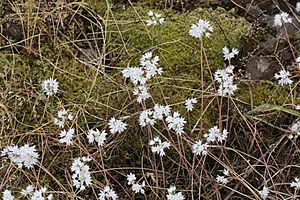Narrowleaf onion facts for kids
Allium amplectens is a type of wild onion often called the narrowleaf onion. This plant is native to parts of North America, including British Columbia, Oregon, Washington State, and California. It usually grows in forests and especially likes soils that are rich in clay or a special kind of rock called serpentine soil.
Quick facts for kids Narrowleaf onion |
|
|---|---|
 |
|
| In Linn County, Oregon | |
| Scientific classification |
What the Narrowleaf Onion Looks Like
The narrowleaf onion grows from a pinkish-brown bulb, which is like a small underground storage unit for the plant. From this bulb, a smooth, green stem grows upwards. At the top of the stem, you'll find a cluster of flowers called an inflorescence.
When the flowers are still closed, this cluster is wrapped in bright pink to magenta-colored bracts. These are like special leaves that protect the developing flowers. When the flowers open, you'll see between 10 and 50 shiny white to pale pink blooms. Each flower is quite small, less than a centimeter wide. Inside each flower, there are six strong stamens (which produce pollen) and an ovary (which will develop into seeds). These parts are usually white, or sometimes have a hint of pink or lavender.
Some special types of narrowleaf onion have been developed, like one called 'Graceful'.
Where the Narrowleaf Onion Grows
This wild onion is found in several western regions of North America. You can spot it in the Canadian province of British Columbia. In the United States, it grows in Oregon, Washington State, and California.
It prefers to live in wooded areas. It especially likes to grow in certain types of soil. These include clay soils, which are heavy and hold water well. It also thrives in serpentine soil, which is a unique kind of soil that comes from serpentine rocks.
See also
In Spanish: Allium amplectens para niños

